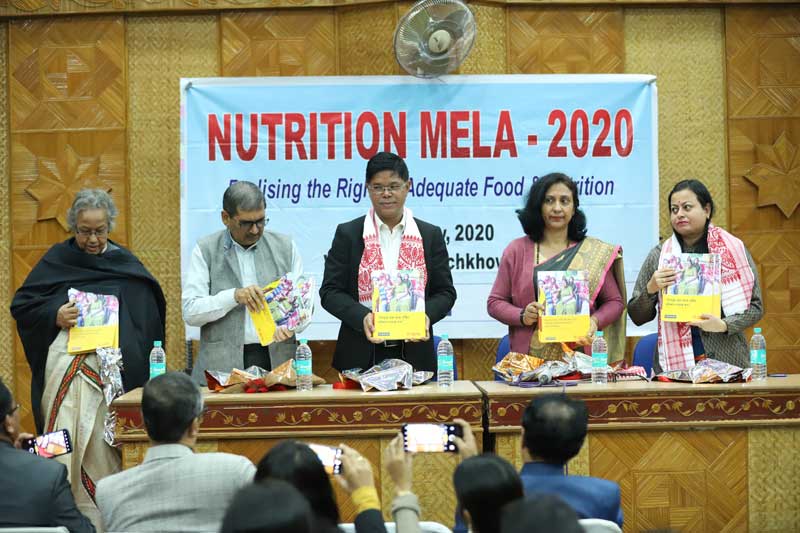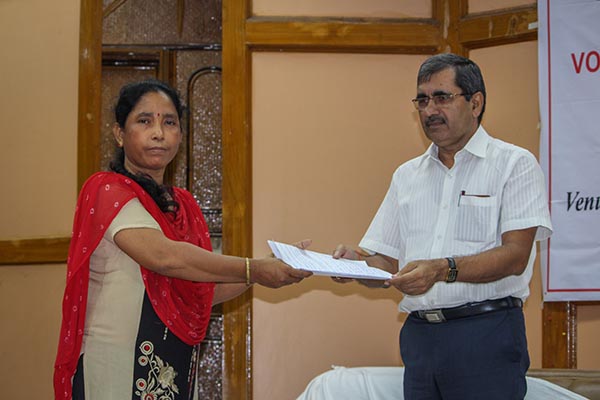Overview
The recently released Global Hunger Index 2019 report states that India scores 30.3, ranking 102 out of 117 countries in the world, being categorized into the ‘Serious Hunger’ category. The report also reveals that only 9.6% of children between 6-23 months in India are fed a minimum acceptable diet.
With 36.4% children under 5 years stunted and Infant Mortality Rate (IMR) as high as 48%, Assam continues to perform poorly in these indicators. Nearly 37% of children (aged 6-59 months) and almost 45% of pregnant women (aged 15-49 years) are anemic (Source-National Family Health Survey-4), the primary reason for which is inadequate nutritional intake.
Keeping in view the incidence of high malnutrition in the state, VHAI & Civic Engagement Alliance are implementing a comprehensive programme, “Realising the Right to Adequate Food and Nutrition” in six districts of Assam- Sonitpur, Goalpara, Morigaon, Dhubri, Darrang and Udalguri. The main objectives of the programme are:
- Enhancing the capacities of NGOs and Women Federations for addressing the issues of malnutrition, and contributing towards achieving the SDG 2 (Zero Hunger), SDG 5 (Gender Equality) and SDG 10 (Reduce Inequality)
- Convening & convincing stakeholder departments for effective implementation of nutrition related schemes, policy level changes etc. and to formulate a multi-sectoral approach to address the issues of malnutrition.
- Identify and build potential women leaders collective at the community level, inclusion of disability and gender issues in policies and guidelines of the concerned departments/sectors that are involved in improving nutritional status of the population.
- Enhancing capacities of NGOs and Womens Federations for addressing the issues of malnutrition and contributing towards achieving the SDG 2(Zero Hunger), SDG 5 (Gender Equality) and SDG 10 (Reduce Inequality).
- Laisioning with stakeholder departments etc. for effective implementation of nutrition related schemes etc) and a multi-sectoral approach to addressing the issues of malnutrition.
- Inclusion of disability and gender issues in policy and guidelines of concerned departments/sectors that are involved in improving Nutritional status.
- Identify and build up a potential women leaders collective at community level
The programme approach is three pronged:
- Evidence through Research (Desk and Field Based)
- Liasioning with key stakeholder departments
- Capacity Building and Networking
Primary Target group: Children < 5 years, pregnant and lactating mother.
Organized target group: Organized women federations is being identified and taken on board for local level support for organizing meeting and continuation of convening and convincing agenda at their level. CSOs at state and district are also being involved.
The programme emphasizes on equitable access to food and nutrition by pregnant & lactating mothers as well as children below five years
Current Activities
India celebrated POSHAN MAAH 2020 from 1st to 30th September. This year POSHAN MAAH focused on crucial aspects like identification of children with MAM and SAM and their referral to mitigate its consequences especially considering the present scenario where nutrition security of vulnerable groups like infants and children is of prime importance. Early initiation and exclusive breastfeeding to be promoted for children up to the age of 6 months and promotion of KITCHEN GARDENS at Anganwadi Centres, schools, government buildings as well as at the household level by the community.
VHAI’s project ‘Realising the Right to Adequate Food and Nutrition’ emphasizes on equitable access to food and nutrition by pregnant and lactating mothers, adolescent girls and children below 5 years of age in six districts of Assam. POSHAN MAAH was celebrated with much fervour and zeal in Assam. Awareness meeting, rallies and nutritious food demonstration programmes were carried out involving youth in all the project districts. The women federation members were able to reach more than 5000 people through these programmes. Awareness messages on nutrition and COVID-19 preventive measures were circulated through phone calls and whatsApp. The activities were carried out throughout the month in collaboration with the concerned Goan Panchayats.
- Federation women leaders are actively coordinating with the local panchayats so that no family is left out from receiving the government provided rations etc. during the lockdown period. Focus is specially to ensure inclusion of vulnerable groups such as women, children and the differently abled. Approximately 3000 dry rations (10 kgs rice, one kg dal, salt, sugar, spices) packets were distributed by our women federation members among the vulnerable families.
- Supporting ‘Stitching Mask’ Initiative: We are supporting the mask making initiative by Self-help groups and women groups have also started preparing face-masks at home and distributing it among the local communities in these districts. More than 8000 masks have been distributed.
- The federation members with guidance from the team have reached out to around 30,000 community members through telephonic calls to sensitise them about COVID-19 prevention and control.
Keeping in mind the lack of information and awareness regarding government initiatives and services for people during the pandemic and lockdown period namely distribution of food essentials, allowances being paid by the government to address the requirement of non-ration card holders, statutory paper-work requirement etc. The programme has initiated separate helpline numbers (at state and district level) to address queries related to food and nutrition security from community members in midst of the COVID -19 pandemic.
The Helplines are set up in consultation with the state and district administration and answer queries related to the Government services in place related to food and nutrition security that the community may avail and other nutrition tips that will help them to boost immunity to tackle the pandemic amongst others. It also helps us in convening & convincing with the District & State Authorities on the challenges & issues faced by the vulnerable people related to food supply & other concerns.
Continuing the efforts from the previous year, Model Kitchen Gardens developed at the AWCs in the project districts are regularly producing organic vegetables for hot cooked meals served to the children. Surplus produce is being distributed to the pregnant and lactating mothers along with the Take Home Ration (THR). Women federation members have successfully lobbied with the district and block Agriculture Department to get regular access to free seeds and saplings to develop these Kitchen Gardens. C&C done at the state and the district level by the team has resulted in the Panchayat and Rural Development (P&RD) department initiating a special drive for development of Kitchen Garden throughout the state.
The untiring efforts by the block federation leaders were recognized by the key stakeholders, as a result of which, federation leaders were included in the 15 member Gaon Panchayat Planning Facilitators Team (GPPFT) in different Gaon Panchayats. This recognition of work by the women’s federation will further strengthen and consolidate their C&C initiatives in the state.
Regular capacity building training at the district and state level was organized in collaboration with Government agencies like Food and Nutrition Board, Poshan Abhiyaan and Centre for SDG, Govt. of Assam. Training on preparation of low-cost nutritious recipes as well as the advocacy toolkit developed by VHAI were provided. Orientation on importance of first 1000 days of life, nutrition and health care of pregnant and lactating mothers was held. Exposure visits to other states to study their best practices models related to food and nutrition security were also facilitated.

A State Level Nutrition Mela (Fair) was held in January 2020 in Guwahati with the objectives of showcasing the work being done by women federations, CSOs/NGOs and government departments etc. in the area of food and nutrition security and sensitizing people on the importance of nutritious food. The fair highlighted the kitchen gardens created by women federations on the premises of Anganwadi Centres and at community level.
Food stalls showcasing organic food and regional cuisines along with mobile exhibition units were set up. Information booths with short films, digital posters, brochures and flyers were put in place to motivate the visitors to adopt safe and nutritious food habits.
Best practices in food and nutrition conceived at the grass roots by various government and non-government organizations to address malnutrition were compiled through secondary resaerch. The primary objective was that the document serves as a tool for policy makers, public health organizations, independent researchers and other stakeholders driven to reduce the state of malnutrition in our country.

